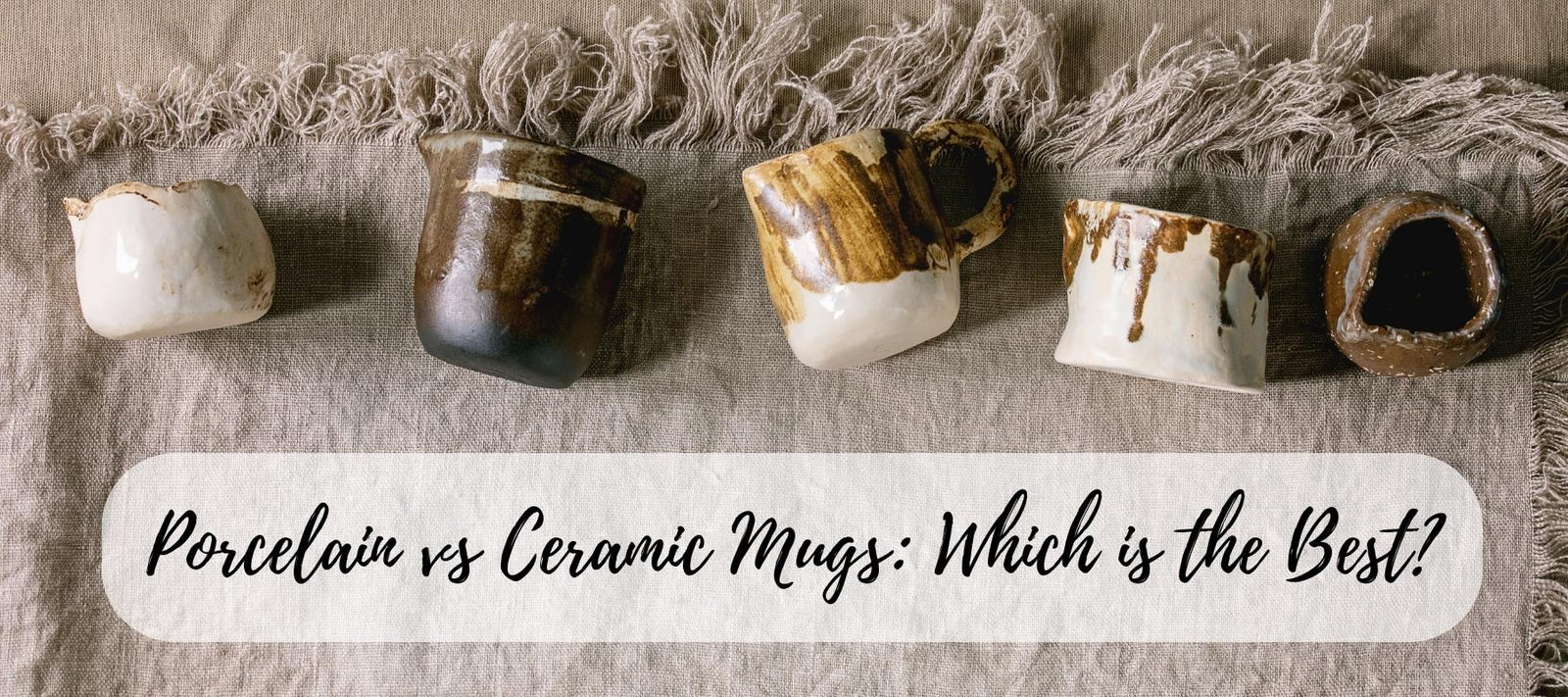
Porcelain and ceramic mugs are two of the most popular types of mugs used today. They both have their advantages and disadvantages and choosing between them can be a difficult decision. The type of mug you choose will depend on your personal preferences, as well as the intended use of the mug.
Porcelain mugs are known for their delicate, translucent appearance and their ability to retain heat. They are made from a type of clay that is fired at high temperatures, which makes them durable and resistant to chipping. Ceramic mugs, on the other hand, are made from a mixture of clay, feldspar, and quartz that is fired at a lower temperature. They are known for their strength and durability and are often used for everyday purposes.
What is Porcelain?
Porcelain is a type of ceramic material that is made from a mixture of kaolin, feldspar, and quartz. It is known for its durability, translucency, and resistance to high temperatures. Porcelain mugs are often considered to be more elegant and refined than ceramic mugs, making them a popular choice for formal occasions.
One of the main characteristics of porcelain is its hardness. It is fired at a high temperature, which makes it extremely strong and durable. Porcelain mugs are less likely to chip or crack than ceramic mugs, making them a good choice for everyday use.
Another advantage of porcelain is its translucency. When held up to the light, porcelain mugs have a slightly translucent quality that allows some light to pass through. This gives them a delicate, refined appearance that is often associated with fine china.
Porcelain mugs also have a smooth, non-porous surface that is easy to clean and does not absorb flavors or odors. This makes them a good choice for coffee and tea, as they will not retain the taste or smell of previous beverages.
Overall, porcelain mugs are a great choice for those who value durability, elegance, and ease of use. While they may be more expensive than ceramic mugs, their longevity and refined appearance make them a worthwhile investment.

Porcelain
What is Ceramic?
Ceramics is a type of material that is made by heating natural clay at high temperatures. It is a popular material for making mugs, plates, and other household items because it is durable and relatively inexpensive.
There are two main types of ceramic mugs: earthenware and stoneware. Earthenware is made from a type of clay that is fired at a lower temperature, which makes it more porous and less durable than stoneware. Stoneware, on the other hand, is fired at a higher temperature, which makes it denser and more durable.
Ceramic mugs can come in a variety of colors and designs, and they are often decorated with glazes, which are liquid coatings that are applied to the surface of the mug before it is fired. Glazes can give the mug a glossy or matte finish, and they can also add color and texture to the surface.
Overall, ceramic mugs are a popular choice for everyday use because they are affordable, durable, and come in a wide range of styles. However, they may not be the best choice for those who are looking for a mug that will keep their drink hot for a long time, as ceramic is not a good insulator.

Ceramic
Porcelain vs Ceramic Mugs: What are the Differences?
When it comes to choosing between porcelain and ceramic mugs, there are a few key differences to consider. Both materials offer their own unique benefits and drawbacks, and ultimately the choice comes down to personal preference.
Material Composition
Porcelain is a type of ceramic that is made from a specific type of clay fired at a higher temperature than other ceramics. This results in a more durable and less porous material, which makes it ideal for use in mugs. Porcelain mugs are typically thinner and more delicate than ceramic mugs, but they are also less likely to crack or chip.
Ceramic mugs, on the other hand, are made from a variety of clay types and fired at lower temperatures than porcelain. This makes them more porous, which can lead to staining or absorption of flavors over time. However, ceramic mugs are often thicker and more substantial than porcelain mugs, which some people prefer.
Heat Retention
Porcelain mugs tend to be better at retaining heat than ceramic mugs due to their denser composition. This means that your coffee or tea will stay hotter for longer in a porcelain mug than in a ceramic mug. However, this also means that porcelain mugs can get hotter to the touch than ceramic mugs, so you may need to use a coaster or sleeve to protect your hands.
Design Options
Both porcelain and ceramic mugs offer a wide range of design options, from classic and simple to bold and colorful. However, porcelain mugs are often favored for their elegant and delicate appearance, while ceramic mugs are more versatile and can be found in a variety of styles and shapes.
Durability
Porcelain mugs are generally more durable than ceramic mugs due to their denser composition and higher firing temperature. They are less likely to crack or chip, and can often withstand more wear and tear than ceramic mugs. However, porcelain mugs can still break if dropped or mishandled, so it's important to handle them with care.
Ceramic mugs are more prone to chipping and cracking than porcelain mugs, but they are often thicker and more substantial, which can make them more durable in certain situations. They are also less likely to break if dropped, although they may still chip or crack.
Overall, the choice between porcelain and ceramic mugs comes down to personal preference and intended use. Porcelain mugs are ideal for those who want a delicate and elegant option that will retain heat well, while ceramic mugs are a more versatile and durable choice.
Pros and Cons of Ceramic Mugs
Pros
Ceramic mugs are a popular choice for many people due to their durability and affordability. They are made from a mixture of clay, kaolin, feldspar, and other natural materials that are fired at high temperatures to create a sturdy and long-lasting product.
One of the biggest advantages of ceramic mugs is their ability to retain heat. They have a thick wall that helps to keep the contents of the mug hot for longer periods, making them perfect for hot beverages like coffee, tea, or hot chocolate. Ceramic mugs also come in a variety of designs and colors, making them a great option for those who want to add a touch of personality to their drinkware collection.
Cons
While ceramic mugs have many benefits, they also have a few drawbacks that should be considered before making a purchase. One of the main issues with ceramic mugs is their weight. They can be quite heavy, especially when filled with hot liquids, which can make them difficult to handle for some people.
Another disadvantage of ceramic mugs is their susceptibility to chipping and cracking. While they are durable, they are not indestructible, and accidental drops or bumps can result in damage to the mug. Additionally, ceramic mugs are not microwave-safe, which can be inconvenient for those who like to reheat their beverages.
Overall, ceramic mugs are a great option for those who want a durable and affordable drinkware option that can keep their hot beverages warm for longer periods. However, they do have a few limitations that should be considered before making a purchase.

Ceramic mugs
Pros and Cons of Porcelain Mugs
Pros
Porcelain mugs are a popular choice for many reasons. Here are some of the benefits of using porcelain mugs:
-
Elegant Appearance: Porcelain mugs have a classic and elegant look that can add a touch of sophistication to any table setting.
-
Lightweight: Porcelain mugs are lightweight, making them easy to handle and carry around.
-
Retains Heat: Porcelain is a great insulator, which means it can keep your drink hot for a longer period of time.
-
Non-porous: Porcelain is non-porous, which means it won't absorb any flavors or odors from your beverage. This makes it ideal for coffee and tea drinkers who want to enjoy the true taste of their drink.
Cons
While there are many benefits to using porcelain mugs, there are also some drawbacks to consider. Here are some of the cons of using porcelain mugs:
-
Fragile: Porcelain mugs are delicate and can easily break if dropped. This makes them less durable than ceramic mugs.
-
Expensive: Porcelain mugs are usually more expensive than ceramic mugs due to the manufacturing process and the materials used.
-
Limited Designs: Porcelain mugs are often limited in design options compared to ceramic mugs, which can come in a wide variety of colors and patterns.
Overall, porcelain mugs are a great choice for those who value elegance and functionality. However, they may not be the best option for those who prioritize durability and affordability.

Porcelain mugs
Porcelain vs Ceramic Mugs: Which Holds Heat Better?
One of the most essential factors to consider when choosing between porcelain and ceramic mugs is their ability to hold heat. Both materials are popular for their heat retention properties, but which one is better?
Porcelain mugs have a reputation for being the best at holding heat. Porcelain is made from a mixture of kaolin, feldspar, and quartz, which gives it a smooth and non-porous surface. This smooth surface allows the porcelain to hold heat for a longer time, keeping your drink warm for a more extended period.
On the other hand, ceramic mugs are also known for their heat retention properties. Ceramic is made from a mixture of clay, minerals, and water, which makes it more porous than porcelain. The porous nature of ceramic allows it to absorb heat quickly, but it also means that the heat dissipates faster, making it less effective at holding heat for a more extended period.
When it comes to which material holds heat better, it ultimately depends on the specific mug's design and construction. A thicker ceramic mug may hold heat better than a thinner porcelain mug, and vice versa. However, in general, porcelain mugs have a better reputation for holding heat for a more extended period than ceramic mugs.
In summary, if you're looking for a mug that will keep your drink warm for a more extended period, then porcelain mugs are the better option. However, if you're looking for a mug that can absorb heat quickly, then ceramic mugs may be more suitable for your needs.
Who Should Get A Porcelain Mug?
Porcelain mugs are a great choice for those who appreciate a delicate and refined look. Porcelain is a type of ceramic that is made from a mixture of clay and other materials, such as feldspar and kaolin. It is fired at a higher temperature than other types of ceramic, which gives it a more refined and delicate appearance.
Porcelain mugs are also known for their durability. They are less likely to chip or crack than ceramic mugs, making them a great option for those who want a mug that will last for years. Additionally, porcelain mugs are non-porous, which means they are less likely to absorb flavors or odors from other drinks.
For those who enjoy a hot teacup, porcelain mugs are a great option. They are excellent at retaining heat, which means your drink will stay warm for longer. Porcelain mugs are also easy to clean and maintain, making them a great option for those who want a mug that is both functional and beautiful.
Overall, porcelain mugs are a great choice for those who want a mug that is both elegant and durable. Whether you're looking for a mug for your morning coffee cup or for entertaining guests, porcelain mugs are an excellent choice.
Who Should Get A Ceramic Mug?
Ceramic mugs are a great option for those who want a stylish and affordable option for their morning coffee or tea. They are generally less expensive than porcelain mugs, making them a great choice for those on a budget.
Ceramic mugs are also more durable than porcelain mugs, making them a great choice for those who tend to be a bit clumsy. They are less likely to chip or break if dropped, which is a great feature for those who have children or pets in the house.
Another advantage of ceramic mugs is that they come in a wide variety of styles and designs. Whether you prefer a classic solid color or a fun and quirky pattern, there is a ceramic mug out there that will suit your tastes.
Overall, if you are looking for an affordable, durable, and stylish option for your morning coffee or tea, a ceramic mug may be the way to go.
What Are FAQs About Porcelain vs Ceramic Mugs?
Does the Mug’s Material Affect the Taste of the Coffee?
Yes, the material of the mug can affect the taste of the coffee. Porcelain mugs are known to be smoother and less porous, which can result in a cleaner taste. Ceramic mugs, on the other hand, may have more texture and can absorb some of the flavors and aromas of the coffee. However, the difference in taste is often subtle and may not be noticeable to everyone.
Are they microwave-safe?
Are mugs microwave safe? Both porcelain and ceramic mugs can be microwave-safe, but it depends on the specific mug. Some porcelain and ceramic mugs may have metallic accents or glazes that can cause them to heat up and potentially crack in the microwave. It is important to check the manufacturer's instructions before microwaving any mug.

Both porcelain and ceramic mugs can be microwave-safe
👍 Explore more: Are Mugs Microwave Safe? Tips for Using Your Favorite Cups Safely.
Are porcelain or ceramic coffee mugs recyclable?
Both porcelain and ceramic mugs are technically recyclable, but they may not be accepted by all recycling programs. Porcelain and ceramic are made from natural materials and are not harmful to the environment. However, the process of recycling these materials can be difficult and expensive. It is best to check with your local recycling program to see if they accept porcelain and ceramic mugs.
In summary, the material of the mug can affect the taste of the coffee, but the difference is often subtle. Both porcelain and ceramic coffee mugs can be microwave-safe, but it is important to check the manufacturer's instructions. Porcelain and ceramic mugs are technically recyclable, but it is best to check with your local recycling program before disposing of them.
Discover more:
👍 Choosing the Perfect Mug: What Are the Best Mug Materials?
👍 Exploring the Pros and Cons of Glass vs Ceramic Mugs.
👍 Exploring the Pros and Cons of Ceramic vs Stoneware Coffee Mugs
Conclusion
In conclusion, choosing between porcelain and ceramic mugs depends on your personal preferences and needs. Porcelain offers elegance and heat retention, perfect for those special occasions. Ceramic, on the other hand, provides durability and a wide range of designs, suitable for everyday use.
Both have their unique qualities, making them great choices for your favorite drinks. Consider what matters most to you in a mug, and you'll find the best fit for your daily coffee or tea rituals.
You may also like:
👍 Coffee Cups: Discover the Perfect Vessel for Your Morning Brew.
👍 Mugs vs Cups: Which One Is Ideal for Your Morning Caffeine Fix?


















Leave a comment